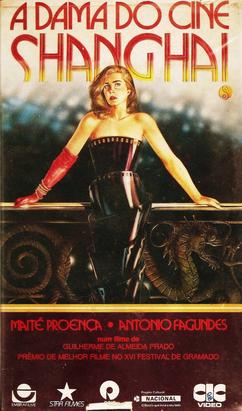Related Research Articles

Yolanda Yvonne Montes Farrington, better known by her stage-name Tongolele, is an American dancer, actress and vedette.

Maria Antonieta Pons was a Cuban-born Mexican film actress and dancer. She was the first actress in the Rumberas films in the 1940s and 1950s, in the Golden Age of Mexican cinema. The Rumberas film genre offered a societal perspective on Mexico during the 40s-50s. It delved into the lives of women deemed as sinners or prostitutes, challenging the prevailing moral and social norms of their era.
The Golden Age of Mexican Cinema is a boom period in the history of Mexican cinema, which began in 1936 with the premiere of the film Allá en el Rancho Grande, and Let's Go with Pancho Villa, culminated in 1956. Characterized by the production of high-quality films that contributed to shaping Mexican national identity and culture. Films such as Luis Buñuel's "Los Olvidados" illuminated the social realities of Mexico, leaving a profound impact on audiences both within the country and abroad.

Rosa Carmina Riverón Jiménez is a Cuban-Mexican actress and dancer.
Juan Rogelio García García, better known as Juan Orol, was a Spanish-born Mexican actor, film producer, director and screenwriter. Orol was a pioneer of the Mexican cinema's first talkies and one of the main promoters of the Rumberas film in the Golden Age of Mexican cinema. His films have been described as cult films.
The Rumberas film was a film genre that flourished in Mexico's Golden Age of Mexican cinema in the 1940s and 1950s. Its major stars were the so-called rumberas, dancers of Afro-Caribbean musical rhythms. The genre is a film curiosity, one of the most fascinating hybrids of the international cinema.

The Shanghai Spell is a 2002 film written and directed by Fernando Trueba. The film is based on the 1993 novel of the same name by Juan Marsé. It is an international co-production among companies from Spain, France and the United Kingdom.

The Lady from the Shanghai Cinema is a 1988 Brazilian thriller film directed by Guilherme de Almeida Prado. The film borrows some references from Hollywood films noirs of the 1940s, mainly Orson Welles' The Lady from Shanghai; its name is a play on the title of Welles's film.
Bellas de noche, also known as Las ficheras, is a Mexican film directed by Miguel M. Delgado. It was filmed in 1975 and starring Sasha Montenegro and Jorge Rivero. It is regarded as the film that began the rise of Mexican sex comedies film genre as a largely mainstream genre in the Mexican Cinema for about a decade and a half; the term "fichera" coming to mean the entire genre.
Gangsters Versus Cowboys is a 1948 Mexican gangster film written, directed by, and starring Juan Orol, and featuring Rosa Carmina and José Pulído. It was made as a sequel to Orol's Gangster's Kingdom. However, it has become a cult film due to its low-budget production values and idiosyncratic style.
Amor salvaje is a Mexican drama film directed by Juan Orol. It was released in 1950 and starring Rosa Carmina and Víctor Junco.
La diosa de Tahití also known as Los chacales de la Isla Verde, is a Mexican drama film directed by Juan Orol. It was released in 1953 and starring Rosa Carmina and Arturo Martínez.
Sandra, la mujer de fuego is a Mexican-Cuban drama film directed by Juan Orol. It was released in 1954 and starring Rosa Carmina and Arturo Martínez.
Siboney is a Mexican-Cuban drama film written and directed by Juan Orol. It was filmed in 1938 and released in 1942, starring María Antonieta Pons and Juan Orol.
Embrujo antillano is a Mexican drama film directed and co-written by Juan Orol. It was released in 1947 and starring María Antonieta Pons and Blanquita Amaro.
Cantaclaro is a 1946 Mexican drama film directed by Julio Bracho and starring Esther Fernandez, Antonio Badú and Alberto Galán. The film is based on the 1934 novel of the same name by Rómulo Gallegos. The film's sets were designed by the art director Jesús Bracho, who was the younger brother of Julio Bracho.
Gangster's Kingdom is a 1948 Mexican crime film written and directed by Juan Orol who also starred in the film. Like Orol's other films it was an attempt to copy the style of Hollywood films of the era.
Tania, the Beautiful Wild Girl is a Mexican drama film written, directed and produced by Juan Orol. It was released in 1948 and starring Rosa Carmina and Manuel Arvide.

Cinnamon Skin is a 1953 Mexican drama film directed by Juan José Ortega and starring Sara Montiel, Manolo Fábregas and Ramón Gay. It was set and partly filmed in Cuba.

The Fantastic World of Juan Orol is a 2012 Mexican black-and-white biographical comedy-drama film directed by Sebastián del Amo and written by Del Amo & Raúl Fernández Espinosa. Starring Roberto Sosa. It was named on the shortlist for Mexico's entry for the Academy Award for Best Foreign Language Film at the 85th Academy Awards, but it was not selected.
References
- ↑ "Cine Mexicano de Galletas: Cabaret Shanghai". Archived from the original on 2016-07-23. Retrieved 2015-12-31.